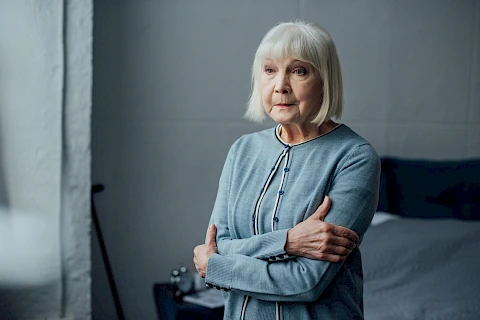
Sundowning is a term that may not be familiar to many, but for seniors and caregivers, it can be a daily challenge. The condition is a common symptom related to Alzheimer's and other types of dementia. It often manifests as increased confusion and agitation during the late afternoon and evening hours. Understanding sundowning symptoms and signs can help caregivers better support senior loved ones affected by the condition and help improve their quality of life.
What is Sundowning?
A neurological phenomenon, sundowning is a complex and disorienting condition that can baffle those who encounter it for the first time. It is associated with increased confusion and restlessness that typically occur late in the day, often as the sun begins to set. According to the Alzheimer's Association, as many as 66% of those with Alzheimer's show symptoms of sundowning.
Symptoms and Signs of Sundowning
Identifying sundowning can be tricky. Its symptoms often mirror those found in general dementia cases, especially in the beginning. Timing is the primary distinguishing factor. Patients exhibiting sundowning tend to experience an escalation of symptoms in the late afternoon to evening hours. Confusion, anxiety, agitation, and even aggression are common. A person might be relatively lucid and calm during the day. However, they become increasingly restless and disoriented as evening approaches. Stressful situations, such as a change in caregiver or a hospital stay, can exacerbate these symptoms.
Managing Sundowning at Home
As with other symptoms of dementia, managing sundowning at home is both a challenge and a necessity. The home environment can offer familiarity and comfort, which can help reduce symptoms of sundowning to some extent. It can also help to adopt a few strategies.
Routines
Try to maintain a routine. Consistency can provide a sense of security to a person with Alzheimer's, helping to reduce anxiety and confusion. Include physical activities during the day to promote better sleep at night. Limit caffeine and sugar intake to morning hours, and ensure a peaceful, dimly lit environment in the evening.
Safe Environments
It's also crucial to ensure the home environment is safe. Use night lights and clear clutter to prevent tripping or falling during episodes of restlessness. Patience and reassurance are key. Understanding that the senior is not acting out intentionally can help caregivers react calmly and effectively.
Seeking Professional Help
While home management strategies can be beneficial, there are times when professional help becomes necessary. A sudden increase in symptoms, extreme agitation, or potential harm to oneself or others may require professional aid and intervention.
Get Alzheimer's and Dementia Help at Senior Helpers Elmwood Park
Understanding the symptoms and signs of sundowning can help family caregivers navigate the challenges of dementia and Alzheimer's while providing appropriate care and support to their senior loved ones.
If you're in Chicago, Elmwood Park, Franklin Park, Schiller Park, or Stone Park, Senior Helpers Elmwood Park is here to help. We provide in-home care for seniors who need a little more assistance at home, including those with Alzheimer's and dementia. Our team of trained caregivers offers personalized services designed to improve your senior loved one’s quality of life for seniors while giving you some peace of mind. Contact us to learn more.